Статьи журнала - Arctic and North
Все статьи: 972
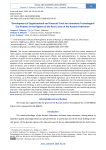
Статья научная
The current macroeconomic and geopolitical situation, combined with the current measures of state support, increasingly stimulate domestic business structures to implement new investment initiatives, which are designed, according to government officials and parliamentarians, to improve the socio-economic situation of the localization sites of such projects. In practice, however, such developments are associated with certain environmental risks such as pollution of water, air, soil, destruction of other key elements of the environment. Such negative impacts are particularly devastating for unique ecologically clean territories, one of which is the Russian part of the global Arctic zone. In this regard, the aim of this study is to develop relevant scientific and practical recommendations for activating and scaling up the investment activity of business structures implementing environmentally-oriented investment projects within the boundaries of the AZRF. The essence of these innovations is based on a combined approach. In particular, it is proposed to introduce up to seven new direct measures of financial incentives for eco-investments by businesses, up to five changes to regional and federal legislation, up to three direct financial injections into the public sector, as well as a significant adjustment of tax legislation into the national economy. From a practical point of view, this will create new preferential conditions for business and stimulate eco-oriented investment thinking, as well as eliminate accumulated environmental damage, restore and rehabilitate most natural sites, preserve biological diversity, develop a comprehensive eco-monitoring system, and take a new significant step towards creating a renewable resource economy.
Бесплатно
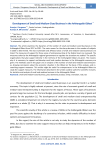
Development of Small and Medium-Sized Business in the Arkhangelsk Oblast
Статья научная
The article examines the dynamics of the number of small and medium-sized businesses in the Arkhangelsk Oblast from 2017 to 2021. The main reason for the sharp decrease in the number of subjects in 2020 is determined. The most vulnerable and affected areas of small and medium-sized businesses are listed. The measures of support for these areas of entrepreneurship at the federal level are reviewed. The measures taken by the Arkhangelsk regional government to regulate the situation are studied. The specific organizations that give support directly in the territory of the Arkhangelsk Oblast are given. The reasons why it is necessary to support and develop small and medium business in the Arkhangelsk economy are given. The methods used in this paper are an analysis of the number of small and medium-sized enterprises, drawing conclusions about the economic situation in the Oblast on the basis of this analysis, and researching support measures. This article might be useful for entrepreneurs in the Arkhangelsk Oblast to study the support measures. The information described in the article could be useful for scientific research, for statistics and analysis of small and medium business in the Arkhangelsk Oblast.
Бесплатно
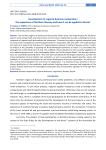
Статья научная
The northern regions of Norway and Russia have similar issues: new mega-projects for the development of oil and gas fields and infrastructure are not only an opportunity but also a challenge for the de-velopment of regional small and medium-size enterprises. To connect to projects, regional enterprises need to increase their competencies and find opportunities for cooperation with each other. The article presents the results of a study of the formation of a regional business alliance in Northern Norway. Further, it offers an analysis of the possibility of applying the North Norwegian experience to Russia. It is concluded that, although from a theoretical point of view, this is difficult, the prerequisites for the successful application of the studied experience exist in the Arkhangelsk Oblast and the Murmansk Oblast. Two business associations are successfully operating there. They were built considering the Norwegian experience, but with the active participation of local industry and authorities, as well as accounting regional specifics, values, and traditions. It is a powerful foundation for the further development of business cooperation. The article contains several recommendations for such forms of collaboration. It is proposed to pay attention to the following: qualification of the coordinator, public-private financing scheme, openness and integration of the project, primary importance of technological cooperation idea and secondary significance of the legal form to be chosen.
Бесплатно
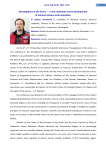
Development of the Arctic — a new milestone in the development of national science and innovation
Статья научная
Review of materials of the conference held on December 3—6, 2014 in Salekhard.
Бесплатно
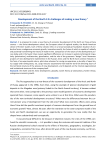
Development of the North 2.0: challenges of making a new theory
Статья научная
It is proposed to create a new theory of economic development of the North on three primary sources — the Soviet development school, the European school of regional studies, the North American school of frontier studies. Each of these schools relies on a broad conceptual foundation (location of productive forces, endogenous economic growth, innovative search), the fusion of which is capable of radically and positively transforming the theory of modern time. Comparison of the nature of the development process today and in the Soviet times reveals significant differences: an increase in spatial and temporal irregularity (polarization), multiactorism, glocalization, and the role of the grassroots “design” level. Numerous projects of new development implemented in the Russian Arctic and the North have common features in the form of an experimental nature, pilot-clone schemes for saving on experience, a plurality of equal status supply and training bases, etc. Large resource corporations that lead the world are directing actors of the territorial structure of the process of new development, and it depends on the internal organizational and institutional structure of the company itself.
Бесплатно
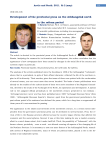
Development of the provincial press on the Arkhan-gelsk north in the reform period
Статья научная
The article is devoted to the provincial press of the Arkhangelsk North of Russia. Analyzing the reasons for its formation and development, the author concludes that the appearance of new newspapers have been caused by changes in the social life of the country and northern region in particular.
Бесплатно
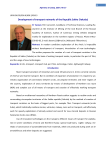
Development of transport networks of the Sakha Republic (Yakutia)
Статья научная
In modern conditions exploration of the Arctic is impossible without development of transport, introduction of new technologies. The author proposes the creation of a net of transport corridors in the Republic of Sakha (Yakutia) on the basis of existing transport nodes, in particular the port of Tiksi, and the usage of new technologies.
Бесплатно
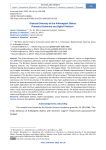
Dialectal Diversity of the Arkhangelsk Oblast: Thematic Dictionary and Digital Platform
Статья научная
The article discusses the “Thematic dictionary of Arkhangelsk dialects”, which is a single-dialect, non-differential explanatory dictionary, and the digital platform that supports the printed materials of this dictionary. The Northern Russian dialects maintain archaic linguistic features, making them attractive for linguistic research. The “Thematic dictionary of Arkhangelsk dialects” contains unique linguistic material collected during dialectological expeditions in the Arkhangelsk Oblast. The distribution of material according to topics contributes, on the one hand, to more in-depth and detailed representation of lexemes and expressions, and, on the other hand, to systematic organization of individual aspects of the worldview of the speakers of the Northern Russian dialects. Within the grant project “Thematic dictionary of Arkhangelsk dialects with electronic support”, conducted by the Northern (Arctic) Federal University named after M.V. Lomonosov, the first three volumes of the dictionary have been published and an independent corpus of dialects has been developed and hosted on the university’s servers. The digital platform consists of desktop and mobile applications for the collection of dialect words, as well as a database and electronic dictionary accessible via a web interface, supplemented by an interactive lexical atlas. The developed lexical atlas provides a visual representation of geographical distribution of dialect words. The dialect material presented in the dictionary and on the platform will be useful both for specialists and for individuals interested in the culture and lifestyle of the Russian North.
Бесплатно
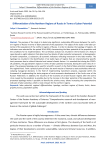
Differentiation of the Northern Regions of Russia in Terms of Labor Potential
Статья научная
The purpose of the study is to determine significant, sustainable differences between the northern regions of Russia in terms of labor potential of the population. The object of the study is the labor potential of the population of the northern regions of Russia. In order to develop the typology of regions, 22 indicators were selected for the period 2014–2020, characterizing the labor potential of the population and the conditions for its implementation. The correlation analysis has resulted in the formation of a feature space based on eight indicators that determine four blocks of labor potential components: a) demographic, b) health component, c) education, d) economic indicators reflecting interaction in the labor market. The typology has resulted in the identification of six stable types of regions that are characterized by specific inert processes due to cultural-historical and natural-climatic factors. It is revealed that during the COVID-19 pandemic, the gap between regions in terms of labor potential increased, leaving the same ratio of regions. The proposed typology can be used for scientific research in the field of labor potential management the regional level. From a practical point of view, the work may be of interest to state authorities when developing managerial decisions in the field of implementing investment projects, especially within the framework of implementing the state program of socio-economic development of the Arctic zone of the Russian Federation. In addition, the recovery of the economy of certain Russian regions after the severe crisis caused by the pandemic is possible due to the increase in the labor potential of the population. The presented typology makes it possible to identify the priority areas, allows increasing the comprehensive indicator of labor potential, which is most relevant for the northern regions.
Бесплатно
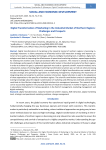
Статья научная
Digital transformation of marketing in the industrial market of northern regions is becoming increasingly important. It allows companies to effectively build a B2B interaction strategy and improve customer service quality using digital technologies, software and digital marketing tools. In addition, digital technologies contribute to improving the effectiveness of operational marketing solutions, expand opportunities for entering new markets and create personalized offers for customers. This research is aimed at analyzing the challenges and prospects of digital marketing transformation in the industrial market of northern regions. In order to achieve this goal, a systematic approach was used as a general scientific research method, and a comparative analysis of existing digital marketing transformation practices was carried out when processing and systematizing data. During the work, a conceptual model of digital transformation was created, which includes strategic and operational approaches to marketing management, emphasizing the importance of integrating data and analytics to optimize customer interaction. Special attention is paid to the adaptation of these approaches to the specifics of northern regions. The scientific contribution consists in systematizing existing knowledge about the digital transformation of marketing and offering new methods and tools that contribute to the effective integration of digital solutions into management processes. The research results can be successfully applied in the practical activities of industrial enterprises in northern regions, as well as in educational institutions for training specialists in the field of management, marketing management and digital marketing.
Бесплатно
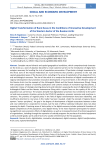
Статья научная
Complex natural-climatic and spatial-geographical conditions, which comprehensively characterize the Arctic as a zone of absolute discomfort, create systemic barriers to the introduction of digital technologies necessary for levelling the risks of population preservation. Of particular strategic importance for the Arctic zone of the Russian Federation are rural territories that provide a presence in the vast and sparsely populated space of the Russian Arctic, including in the areas of exploitation of key deposits of mineral and biological resources. The aim of the article is to analyze the directions of digital transformation of regional development that promotes innovative development of rural territories in the Western sector of the Russian Arctic (on the example of the Arkhangelsk Oblast and the Nenets Autonomous Okrug). Along with comparative analysis of scientific publications and content analysis of normative legal documents, a systematic review of strategic planning documents and indicators assessing the level of digitalization of the Arkhangelsk Oblast and the Nenets Autonomous Okrug with a special focus on the quality of life of the population was carried out. The analysis showed that digitalization processes react sensitively to the political and socio-economic situation, primarily the COVID-19 pandemic, economic recession and sanctions restrictions. The priorities of regional policy in the field of digital transformation have been identified, and insufficient attention to rural areas in this matter has been revealed. Under the concept of regional development “center-periphery”, the gap in the degree of development of digital ecosystems between urban and rural settlements is expected to increase, but the lack of official statistical indicators does not allow assessing its depth. Promising areas of state policy in the digital economy include systematic formation of digital competencies of the population, since digital literacy is the most important prerequisite for obtaining significant socio-economic effects of digitalization, as well as increasing the level of technical equipment of organizations, including through the expansion of subsidy programs for purchase of technical equipment used to provide goods, works and services of a socially oriented nature for the population.
Бесплатно
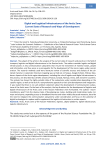
Статья научная
The subject of the article is the analysis of the current state of research and practice in the field of transport, logistics and digital infrastructures in the Russian Arctic. The authors consider logistic and digital infrastructures as key communication subsystems that ensure the movement of material values, people and information, and thus serve as a prerequisite for the development of the macro-region under consideration. The research methods used were literature review of scientific sources and analysis of the obtained material. A systematic literature mapping was carried out on Scopus, Google Scholar, Elibrary databases. Aspects of the Arctic region development, including the role of logistics and digital infrastructures in this process, are described by scientific schools of Russia, Canada, Norway, China, USA and other countries. The analysis has shown the highly variable state of the subsystems under consideration depending on the specific region, as well as the lack of a comprehensive approach to their joint development and integration. It was stated that there is no such problem statement about the development of communication subsystems of the Arctic zone. On the basis of the analysis, the key directions for the development of logistics and digital infrastructure of the Arctic zone of the Russian Federation were formulated. The authors’ recommendations, apart from the obvious tasks of developing sea routes, building and modernizing roads, railways and airports, expanding access to broadband internet and other widely discussed measures, describe the need to integrate the communication subsystems under consideration and focus on the potential of digital technologies to replace and/or supplement the logistics infrastructure in certain aspects.
Бесплатно
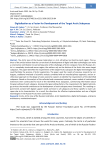
Digitalization as a Factor for Development of the Target Arctic Subspaces
Статья научная
The Arctic zone of the Russian Federation is a rich, attractive, but hard-to-reach region. The authors of the article believe that the current level of development of digital and data technologies can make a constructive contribution to overcoming some of the challenges of Arctic conquest. Since the Russian Arctic is a complexly structured macro-region, the authors rely on the division of the Arctic into seven target subspaces. The paper identifies the requirements of the target Arctic subspaces for digital technologies that could facilitate the process of Arctic exploration. The paper used the results of previous research by colleagues, traditional methods of scientific analysis combined with an interdisciplinary approach, and an architectural approach to the design of socio-economic systems to identify the requirements of the identified subspaces. Based on the analysis of the collected and summarized materials, seven models of motivational extensions were constructed for each of the identified Arctic subspaces, summarizing information about the goal-setting of each subspace. Among other goal-setting factors, the requirements for digital technology services that would contribute to the development of each subspace were formulated. The resulting requirements contain both digital support needs common to all subspaces and those specific to each subspace due to its characteristics. As a result, the directions for effective implementation and use of digital technologies in the Russian Arctic were summarized.
Бесплатно
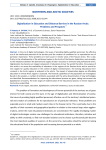
Digitalization in education and distance barriers in the Russian Arctic: problems and prospects
Статья научная
In the era of digital technologies, the issues of providing highly qualified personnel, the effective use of the intellectual potential of the territory and the creation of conditions for its reproduction are of particular importance. These problems are more acute in remote areas of the Russian Arctic. This is due, firstly, to the ultradispersity of the settlement system in the Arctic of the Russian Federation, and, secondly, to the imbalance between the demand and supply of labor resources in territorial and professional terms. Digitalization has become an integral component of education all over the world; therefore, the purpose of this article is to assess the availability of education in the regions of the Russian Arctic and to search for new targets for quality education in the context of digital transformation. The existing educational environment in the Arctic regions is analyzed in the article. The impact of urbanization degree on affordable education in remote Arctic regions is assessed. The financial capabilities of the population are investigated. Based on the analysis, a number of problems associated with the active dissemination of new technologies are identified. Recommendations for improving the educational process are given, taking into account the digitalization of society. The main stages of modernization of the educational process in remote regions of the Arctic are identified.
Бесплатно
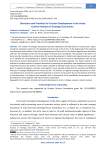
Статья
The number of strategic documents has been adopted at the federal level in recent years, establishing the regulatory regime for the development of tourism in the Arctic. At the beginning of the study the key directions and priorities of the tourist development of the Arctic on the federal agenda were identified, and then the strategies of the nine Arctic regions of Russia were considered. The purpose of the work is to determine the key directions and priorities for tourism development in federal and regional policies, as well as to identify the correspondence of regional strategic directions for tourism development with the key directions of tourism development in the Arctic declared by the federal agenda. The study is based on the method of content analysis of regional documents by assessing the qualitative and quantitative presence of keywords chosen by the authors, which made it possible to identify trends that are reflected to varying degrees in regional strategies, concepts, and programs. It was possible to demonstrate common and different features in strategic development of Arctic tourism. The analysis of regional strategic documents on tourism development reveals the existing heterogeneity in content and structure due to the diversity of formats of the documents. The analysis also revealed a lack of assessment of the possibilities and prospects for the development of interregional and intermunicipal cooperation.
Бесплатно
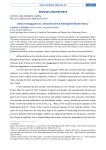
District newspapers as a chronicler of the Arkhangelsk North history
Статья научная
The article discusses the creation and operation of district periodicals in the Arkhangelsk Oblast. The author analyzed their role in solving problems in different periods and evaluated the place of the “district” in the relations of the state and local authorities. Based on a study of modern local periodicals, the author concluded that the press, freed from the CPSU dictates, became dependent on new power and was forced to cover mainly its activities and achievements. The way out of this situation is the creation of municipal newspapers.
Бесплатно
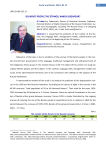
Do nents people the ethnos, which disappear?
Статья научная
It is researched the problems of the number of the Nenets, the language skills, management models, administrative and territorial unit at the beginning of the XXI century.
Бесплатно
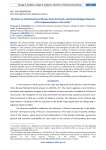
Статья научная
The article considers socio-economic and socio-biological aspects of the Russian Food Security Doctrine, approved on January 21, 2020. The need to monitor Russia's food security is due to significant changes in “the country's socio-economic development, the emergence of new risks and threats to food security caused by economic sanctions imposed in 2014 by a number of Western countries against our country, the openness of the national food market” in connection with the accession to the World Trade Organization, and the deepening integration within the EAEU. The article examines modern approaches to the definition of state food security. Certain provisions of the Doctrine of Food Security of the Russian Federation are assessed, the analysis of food security in Russia in terms of self-sufficiency, economic and physical availability of food was carried out on the basis of statistical data. Food security in Russia has been achieved for the main items of food products, which is confirmed by the results of the analysis performed. A similar positive trend in the development of our country is confirmed by the estimates of foreign researchers based on the results of the Global Food Security Index monitoring. A comparative analysis of the diet of the population of Russia and the Arkhangelsk and Murmansk Oblasts is given. The work focuses on socio-biological risk factors for food security in the Arctic region of Russia.
Бесплатно
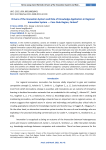
Статья научная
In the northern periphery, actions are needed to support regional economic development. According to widely shared understanding, innovations are at the core of sustainable economic growth. The regional innovation system (RIS) approach is a framework that has been developed for the design and implementation of innovation-based regional policies. This concept implicates new roles for public and private actors in the system. The role of the public sector is related to generating and diffusing knowledge to the companies and industrial networks. On the other hand, companies have increased collaboration with other actors and utilization of external knowledge for innovation and commercial purposes. The case analysis in this study is based on data from experiments in Oulu region, Finland, which has a long history in developing public-private collaboration and innovation system. The focus of the analysis is on knowledge application and exploitation, and their implications for the public driven innovation system and activities. Operational tools and activities are divided into three different categories: company collaboration, business development, and competence development. The analysis also reveals some examples of the future prospects and challenges in the region.
Бесплатно

Driving forces and development problems of cargo flows along the Northern Sea Route
Статья научная
The author analyzed the trends and prospects of the Northern Sea Route. The main problem is that this rather complex system is influenced by many factors, often contradictory and poorly predictable. Thus, the increase in demand for energy and resources determines the overall need for the development of the Arctic shelf. However, the possible cooling and worsening of the ice conditions may adjust to the possibility of transporting of the resources to the Asia-Pacific market, for instance. In this regard, along with the methods of factor and economic analysis the expert approach was used for the study. Its main result is a package of proposals aimed at supporting the Arctic marine cargo flow.
Бесплатно

